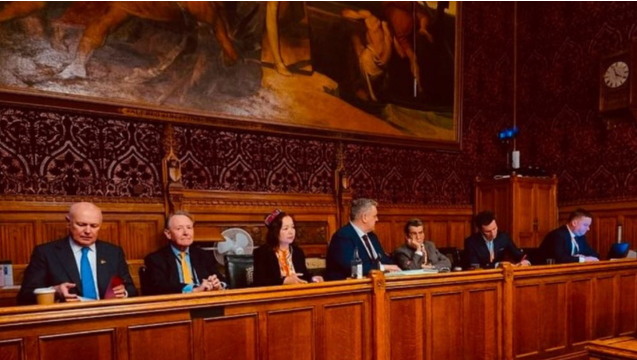Where Do We Go From There, Three Years After the Uyghur Tribunal’s Decision?
The panel convened at the UK House of Commons to commemorate the third anniversary of the Uyghur Tribunal’s genocide determination. Left to right: Sir lain Duncan Smith , Lord David Alton, Rahima Mahmut, Blair McDougall (chair) MP, Sir Geoffrey Nice KC, Dr Gearóid Ó Cuinn (GLAN), Michael Polak (barrister).
Admitting a genocide is underway against the Uyghur people would compel the UK government to act; something it has refused to do, claims Sir Geoffrey Nice, KC, chair of the Uyghur Tribunal that delivered its damning verdict against China on December 9, 2021.
At an event at the UK Parliament to mark the third anniversary of the Uyghur Tribunal’s genocide verdict on December 9, and the 76th anniversary of the Genocide Convention, Sir Geoffrey condemned world inaction, particularly that of the UK government. He urged more pressure on the Chinese state to answer for its “crimes.”
Sir Geoffrey described as “rubbish” the idea held by the British Government that only a “competent court” could determine genocide. “If you see a crime being committed you should act,” he said. “Our government should have acted on the information coming to it. It should have assessed the evidence.”
Instead of speaking up, the UK government has stood by and watched “three years of irreversible and unstoppable genocidal mentality and intent,” he said.
Sir Geoffrey Nice, KC, addressing the 3rd anniversary commemoration of the Uyghur Tribunal genocide determination on December 9, 2024. Left, chair Blair McDougall, right, Dr Gearóid Ó Cuinn (GLAN).
While parliamentarians around the world have resoundingly condemned the Chinese government, declaring the mass sterilizations, of the Uyghur people, incarcerations, and a tranche of human rights violations as genocide in more than 15 countries, their governments have resisted following suit.
Despite Palace of Westminster lawmakers declaring China’s treatment of its Turkic peoples a genocide, the UK government continues to woo the superpower.
Whereas as Shadow Foreign Secretary, David Lammy agreed to find legal routes to recognize the genocide, following Labour’s recent election victory he has been accused of backtracking; instead, currying favour with China’s President Xi Jinping and promising a new era of cooperation.
“This is not a day to celebrate but a day to condemn our parliament,” said Sir Geoffrey. “Parliament drives government, and our government elected not to use the word genocide because if it did it would have had to intervene,” he said.
Chairing the panel of speakers chosen for the event, MP Blair McDougall, chair of the APPG (All-Party Parliamentary Group) on Uyghurs accused the government of compliance for “refusing to engage” in its “moral responsibility.”
Dr Gearóid Ó Cuinn, Director of Global Legal Action Network (GLAN), told the panel that his organization was trying to hold China accountable by opening a new front in the battle against forced labour. Whilst information was no longer leaving the Uyghur homeland, the personal stories still “burned with urgency,” he said.
“Information might not be getting out, but commodities are, the fruits of their forced labour,” he said. “Uyghurs are incarcerated and sent to industrial camps. They produce cotton and tomato-based goods and other goods that flow freely into our retail spaces, into our high streets and our economies, and governments again fail to act.”
Members of the Uyghur Tribunal team, Catherine Roe, (2nd left) Professor Dame Parveen Kumar (centre) and far right Professor Raminder Kaur, Rahima Mahmut (director of UK World Uyghur Congress and Stop Uyghur Genocide) 2nd right, and Maira Asia, far left, President of the UK Uyghur Community.
In October 2022, the group took the UK government to court for failing to investigate the provenance of Chinese cotton, thought to be from Uyghur slave labour. They lost the case, but two years later in June 2024 won an appeal, meaning companies failing to investigate the source of their goods could risk prosecution.
The GLAN group of lawyers and investigators has committed to hold retailers accountable. “We believe these are proceeds of a criminal act, and everything derived from it is contaminated with that criminality,” he said. “It ought to be investigated and halted.”
Rahima Mahmut, chair of the activist group Stop Uyghur Genocide and the UK branch of the World Uyghur Congress, said seven “long” years had passed since the CCP stepped up its campaign against the Uyghurs. Despite her own and the personal tragedies and sadnesses of her people, she had not come to the event for sympathy but to make another call for action, she said.
“The UK has a moral and legal obligation to hold those responsible, accountable,” she urged. “It should take a leading role in addressing the issue.”
Sir Iain Duncan Smith, sanctioned by the CCP for his work highlighting its human rights abuses, condemned the UK government for deriving economic benefit from an ethnic group that was “in the process of being eradicated.” Uyghur forced labour goods from China are flooding UK markets unchallenged, he said. “We know where they come from. We should boycott everything made in China. People have the commercial power to walk away from these things, but they don’t want to,” he said.
Speaking after the event Rahima Mahmut said, “This gathering was a tribute to the resilience of genocide survivors and a solemn moment to honor the victims, amplify their stories, and renew our collective call for justice and the prevention of future atrocities. Together we stand for justice.”













